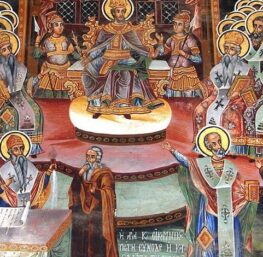Spiegel Claus Christian Malzahn March 29, 2007
Forty-eight percent of Germans think the United States is more dangerous than Iran, a new survey shows, with only 31 percent believing the opposite. Germans’ fundamental hypocrisy about the US suggests that it’s high time for a new bout of re-education.
The Germans have believed in many things in the course of their recent history. They’ve believed in colonies in Africa and in the Kaiser. They even believed in the Kaiser when he told them that there would be no more political parties, only soldiers on the front.
Not too long afterwards, they believed that Jews should be placed into ghettos and concentration camps because they were the enemies of the people. Then they believed in the autobahn and that the Third Reich would ultimately be victorious. A few years later, they believed in the Deutsche mark. They believed that the Berlin Wall would be there forever and that their pensions were safe. They believed in recycling as well as in cheap jet travel. They even believed in a German victory at the soccer World Cup.




Two things on this.
First, it’s time to let the Germans off the hook for WWII. Enough of the whole collective guilt trip. My Polish wife has had 20-something Germans apologize for WWII. Sorry, this is past its sell-by-date. If modern Germans are unreasonably anti-American, part of the major reason for it is that having collective guilt pounded into them for 50 years has made them completely open to leftist thought.
After all, suppose a conservative, pro-German politicians suddenly made his appearance. Say that he used rhetoric similar to the rhetorical flourishes our own politicians are prone to use. Suppose he made speeches like, “Germany and the German people have a great and glorious history of which we should all be proud. I believe Germany today is one of the greatest nations on Earth, and that we should hold onto and in fact celebrate our history, our language, and our traditions!”
Republicans and Democrats alike would be trampling over each other to get to the microphone to call him a NAZI. Any expression of German patriotism is treated with disdain and dismissed as a neo-NAZI revival.
So the Germans have embraced a neutered sort of globalist, ‘we are the world’ style of socialism. In this view, homeschooling is dangerous as is anything that might herald the revival of German individualism or independence from the group think foisted on the Germans post-WWII.
Of course this only gets rebuke from American conservatives.
And while we are on the subject of the Mullahs, a lot of flack has been aimed at the Germans and Europeans lately. I wonder if Dinesh D’Souza’s latest column will be reprinted here on Orthodoxy Today, in which he states (on Townhall.com):
We expect clarity out of the Germans, when our own conservative commentators produce such drivel.
This Holy Week, let’s pull the beam out of own eye.
Glen, you have a flair for overstatement. If collective guilt is the cause of German leftism, why are France, England, Holland, et.al. suffering from the same leftist illusions?
The Dinesh D’Souza debates in the conservative press have been very interesting. Several of his essays have been reprinted here, btw.
Pornography — The Real Perversion
Rethinking Abu Ghraib
as well as some critical of his views:
Dinesh the Dhimmi
I don’t have a beef with Dinesh over everything he writes. Some of his stuff is quite good. His perspective on Islam seems a bit off, especially when he says that even if critiques of Islam are true, we should not talk about them.
Leftism has in deed run amok across the continent of Europe, but does it stand to reason that the cause of leftism and political correctness are necessarily the same for each nation? Leftism has also made massive in-roads in the United States, but have the same forces driven the process here as in Europe or in Venezuala?
I have read extensively about the plight of German homeschoolers, and they all have similar things to say. After WWII, the defeated German nation and its Western handlers valued control above all else. They left in place many centralized features of the German state as built by Hitler, and focused on controlling all outbursts of German nationalism that might prove threatening. The goal was a deracinated German nation.
Here is an interesting quote from a homeschooling magazine:
Why is it legal to homeschool in the other European countries and not in Germany?
Rest of article here: http://www.triviumpursuit.com/blog/2006/12/27/the-homeschool-movement-in-germany/
The collective guilt and the retained socialist institutions following WWII with an emphasis on control have to both be dismantled if Germany is to rise again as a free nation. This means that we have to stop beating up Germans for what happened 50 years ago, and we have to accept authentic expressions of German nationalism. Pride in one’s country is not a negative thing, but in Germans it seems to give the rest of the world a collective fit.
You can disagree or agree, but don’t you think it is high time that Germans quit reminding themselves about their horrible past, and embraced their own culture before the Muslims take it from them?
Well, I think it should be remembered, just like all of history, but not so obsessed about that the nation will have no pride. If we remember, Germany was very destitute after World War I, and had very low morale, before Hitler came to power.
Dear All:
Why did one choose this article, there are others; “Bush: A Spectator at His Own Decline”. This was a commentary on a Sabine Christiansen interview with President Bush. She is a well known TV presenter in Germany. The interview was given when he visited Angela Merkel.
One view of the Germans, of the ages polled, is that they are anti war-any war. And Bush’s unilateral-pre-emptive war was looked upon as an anathema, i.e. and the American people backed it. Of course now the majority of Americans do not back it and now see it as self-destructive to their state and the economy. Don’t forget that Hitler was also a unitary executive like Bush has tried to be one. The war-Bush talking to God about going to war- tinges of blasphemy, the prisons, the polemic, the renditions, the torture and the massive destruction of a country and its population and its civilization has been very destructive to trans-Atlantic relations The war has unleashed the whirlwind of civil war and brought turmoil to the whole region.
One of the main ideas of having a European Union was to do away with continental wars. There have been many more wars across the continent than across North America. Most of these wars were fought in the areas of German speaking Europe.
The people of the various countries in Europe do have a mind of their own; why should they think as Americans think and do as they do. Their total experience is different than that of the people of USA. Of course the Europeans look down on the Americans as the Americans criticise and look down on the Chocolate Republics and other inane references.
Mr. Claus Christian Malzahn writes and talks a lot; he is the right of centre internet forecaster for the left leaning Der Spiegel. He is very prolific and likes the US for its freedom of thought and innovations in business and its ability to change when necessary. Left and right is not the same for each European country as it is thought of in the US.
Remember, in the heart of every German is a policeman. If something isn’t kosher it should be corrected; they will say what they think not what one would want to hear. Don’t think on this to much.
Sincerely,
J R Dittbrenner
Don’t forget that Hitler was also a unitary executive like Bush has tried to be one.
BAH!! Thanks for the laugh…;)
Francis Fukayama, author of The End of History and the Last Man argues for the European approach towards development of a market economy and democracy and against the Bush appoach.
The history at the end of history